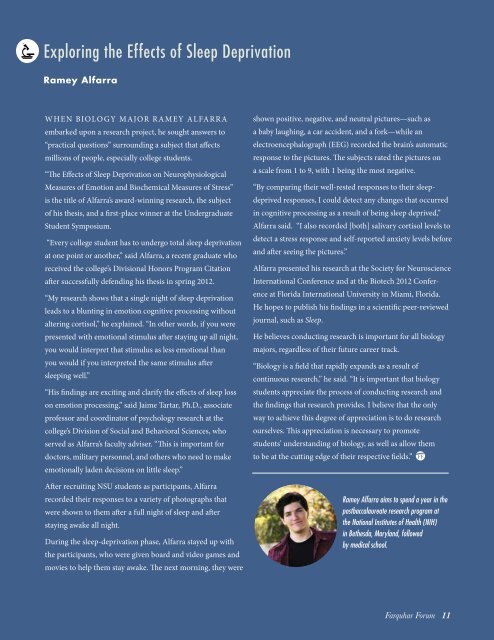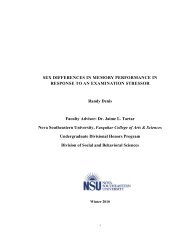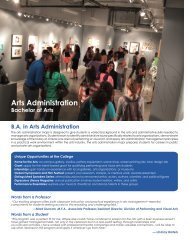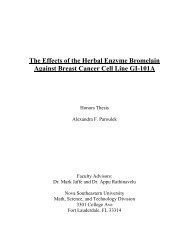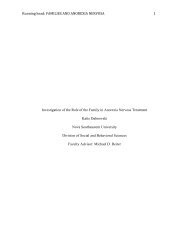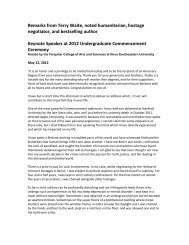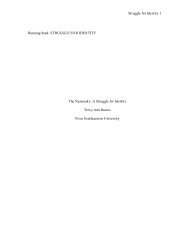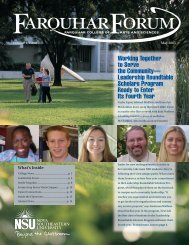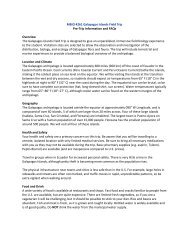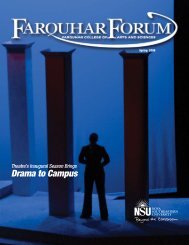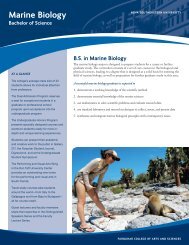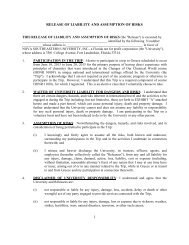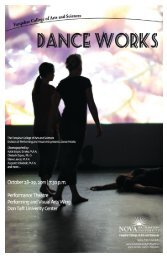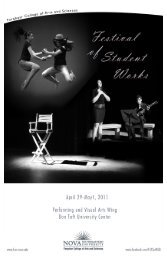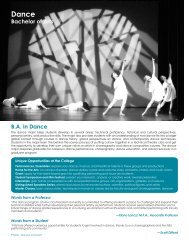2012â2013 - College of Arts and Sciences - Nova Southeastern ...
2012â2013 - College of Arts and Sciences - Nova Southeastern ...
2012â2013 - College of Arts and Sciences - Nova Southeastern ...
Create successful ePaper yourself
Turn your PDF publications into a flip-book with our unique Google optimized e-Paper software.
Exploring the Effects <strong>of</strong> Sleep Deprivation<br />
Ramey Alfarra<br />
When biology major Ramey Alfarra<br />
embarked upon a research project, he sought answers to<br />
“practical questions” surrounding a subject that affects<br />
millions <strong>of</strong> people, especially college students.<br />
“The Effects <strong>of</strong> Sleep Deprivation on Neurophysiological<br />
Measures <strong>of</strong> Emotion <strong>and</strong> Biochemical Measures <strong>of</strong> Stress”<br />
is the title <strong>of</strong> Alfarra’s award-winning research, the subject<br />
<strong>of</strong> his thesis, <strong>and</strong> a first-place winner at the Undergraduate<br />
Student Symposium.<br />
“Every college student has to undergo total sleep deprivation<br />
at one point or another,” said Alfarra, a recent graduate who<br />
received the college’s Divisional Honors Program Citation<br />
after successfully defending his thesis in spring 2012.<br />
“My research shows that a single night <strong>of</strong> sleep deprivation<br />
leads to a blunting in emotion cognitive processing without<br />
altering cortisol,” he explained. “In other words, if you were<br />
presented with emotional stimulus after staying up all night,<br />
you would interpret that stimulus as less emotional than<br />
you would if you interpreted the same stimulus after<br />
sleeping well.”<br />
“His findings are exciting <strong>and</strong> clarify the effects <strong>of</strong> sleep loss<br />
on emotion processing,” said Jaime Tartar, Ph.D., associate<br />
pr<strong>of</strong>essor <strong>and</strong> coordinator <strong>of</strong> psychology research at the<br />
college’s Division <strong>of</strong> Social <strong>and</strong> Behavioral <strong>Sciences</strong>, who<br />
served as Alfarra’s faculty adviser. “This is important for<br />
doctors, military personnel, <strong>and</strong> others who need to make<br />
emotionally laden decisions on little sleep.”<br />
After recruiting NSU students as participants, Alfarra<br />
recorded their responses to a variety <strong>of</strong> photographs that<br />
were shown to them after a full night <strong>of</strong> sleep <strong>and</strong> after<br />
staying awake all night.<br />
During the sleep-deprivation phase, Alfarra stayed up with<br />
the participants, who were given board <strong>and</strong> video games <strong>and</strong><br />
movies to help them stay awake. The next morning, they were<br />
shown positive, negative, <strong>and</strong> neutral pictures—such as<br />
a baby laughing, a car accident, <strong>and</strong> a fork—while an<br />
electroencephalograph (EEG) recorded the brain’s automatic<br />
response to the pictures. The subjects rated the pictures on<br />
a scale from 1 to 9, with 1 being the most negative.<br />
“By comparing their well-rested responses to their sleepdeprived<br />
responses, I could detect any changes that occurred<br />
in cognitive processing as a result <strong>of</strong> being sleep deprived,”<br />
Alfarra said. “I also recorded [both] salivary cortisol levels to<br />
detect a stress response <strong>and</strong> self-reported anxiety levels before<br />
<strong>and</strong> after seeing the pictures.”<br />
Alfarra presented his research at the Society for Neuroscience<br />
International Conference <strong>and</strong> at the Biotech 2012 Conference<br />
at Florida International University in Miami, Florida.<br />
He hopes to publish his findings in a scientific peer-reviewed<br />
journal, such as Sleep.<br />
He believes conducting research is important for all biology<br />
majors, regardless <strong>of</strong> their future career track.<br />
“Biology is a field that rapidly exp<strong>and</strong>s as a result <strong>of</strong><br />
continuous research,” he said. “It is important that biology<br />
students appreciate the process <strong>of</strong> conducting research <strong>and</strong><br />
the findings that research provides. I believe that the only<br />
way to achieve this degree <strong>of</strong> appreciation is to do research<br />
ourselves. This appreciation is necessary to promote<br />
students’ underst<strong>and</strong>ing <strong>of</strong> biology, as well as allow them<br />
to be at the cutting edge <strong>of</strong> their respective fields.”<br />
Ramey Alfarra aims to spend a year in the<br />
postbaccalaureate research program at<br />
the National Institutes <strong>of</strong> Health (NIH)<br />
in Bethesda, Maryl<strong>and</strong>, followed<br />
by medical school.<br />
Farquhar Forum<br />
11


